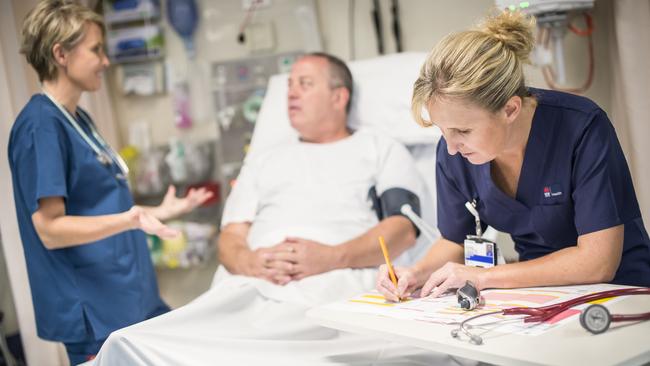Nurse exodus fears as burnout hits 70pc after Covid-19 pandemic
The ‘devastating impact’ of the pandemic has left more than a quarter of nurses dealing with mental illness or distress.

The “devastating impact” of the Covid-19 pandemic has compounded the struggles of the nursing profession, with almost 70 per cent of nurses revealing they are grappling with fatigue or burnout and more than a quarter are dealing with mental illness or distress.
The revelations emerged from a survey of 1000 nurses as part of a report released by the Health Professionals Bank and Australian College of Nursing. The challenges of the pandemic have exacerbated challenges faced by nurses and intensified fears of an exodus from the profession.
After two years of Covid-19, slightly under 69 per cent of respondents said they were experiencing fatigue or burnout, while almost half were struggling with uncertainty and confusion.
Despite the risk of infection, more than 30 per cent said hospitals provided insufficient personal protective equipment.
Among five recommendations, the report called for structural reform in decision-making processes to ensure that nurses were “present and proportionately” represented at every place a healthcare decision was made. It also pushed for nurse employment conditions to be improved across the board.
The grievances of nurses exploded in a display of industrial action in mid-February, with thousands of nurses converging on NSW parliament to protest against stagnant pay and staffing shortfalls.
After experiencing the impact of the pandemic first-hand, Hayley Chandler, 26, believes the industry is about to witness a “mass exodus” of nurses. She is speaking from experience. A confluence of factors has convinced her to leave the profession to study law.
Ms Chandler – who works at multiple healthcare services including acute hospital care across Sydney – said she did not hate her workplace but the pandemic made her reassess her prospects.
“When you’re trying to do your best and you’re not met with manners or you are spoken to like a second-class citizen, it can be very demotivating to continue to come to work like that,” she said.
That is not her experience alone. Despite the personal and professional toll of their vital work, more than two-thirds of respondents felt their contributions throughout 2019-20 hadn’t been adequately recognised by the broader community.
“In my 20-plus years of nursing, I have always loved my profession. After two years of this with no leave, unclear directives, staff shortages, long hours, I don’t enjoy my work anymore,” one respondent said.
The report also showed nurses were surprised by governance failures. Almost 64 per cent of those surveyed said there was confusion around mandates and correct procedures. A slightly higher proportion called for clearer communication from governments.
The Nurse Leadership During Disruptive Events report demonstrated the pandemic was a double-edged sword for nurses, as already problematic staffing shortfalls were brutally exposed.
The demand for frontline medical staff to work at testing clinics meant those who remained – in aged care, community care and other roles – took on the “work of several nurses”.
Australian College of Nursing chief executive Kylie Ward called for governments to implement all the recommendations in full as outlined in the report, noting that without the input of nurses, healthcare decision-making was missing a broad section of the Australian community: “You’re missing the voice of what the people need, and what’s best for the communities to provide care.”




To join the conversation, please log in. Don't have an account? Register
Join the conversation, you are commenting as Logout